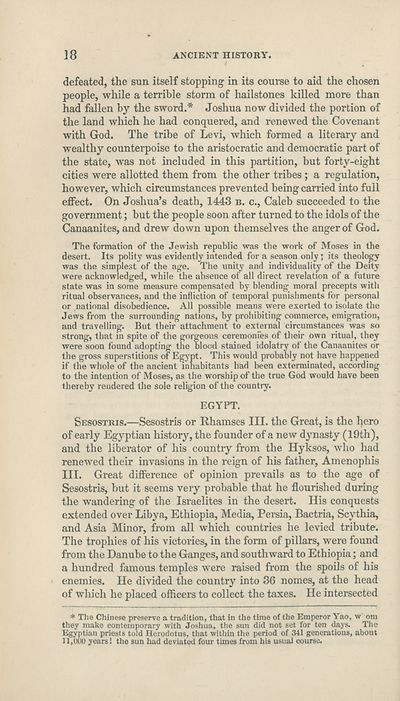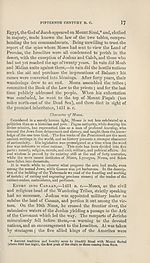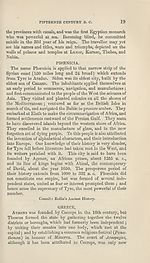Download files
Complete book:
Individual page:
Thumbnail gallery: Grid view | List view

18
ANCIENT HISTORY.
defeated, the sun itself stopping in its course to aid the chosen
people, while a terrible storm of hailstones killed more than
had fallen by the sword.* Joshua now divided the portion of
the land which he had conquered, and renewed the Covenant
with God. The tribe of Levi, which formed a literary and
wealthy counterpoise to the aristocratic and democratic part of
the state, was not included in this partition, but forty-eight
cities were allotted them from the other tribes; a regulation,
however, which circumstances prevented being carried into full
effect. On Joshua’s death, 1443 b. c., Caleb succeeded to the
government; but the people soon after turned to the idols of the
Canaanites, and drew down upon themselves the anger of God.
The formation of the Jewish republic was the work of Moses in the
desert. Its polity was evidently intended for a season only; its theology
was the simplest of the age. The unity and individuality of the Deity
were acknowledged, while the absence of all direct revelation of a future
state was in some measure compensated by blending moral precepts with
ritual observances, and the inHiction of temporal punishments for personal
or national disobedience. All possible means were exerted to isolate the
Jews from the surrounding nations, by prohibiting commerce, emigration,
and travelling. But their attachment to external circumstances was so
strong, that in spite of the gorgeous ceremonfes of their own ritual, they
were soon found adopting the blood stained idolatry of the Canaanites or
the gross superstitions of Egypt. This would probably not have happened
if the whole of the ancient inhabitants had been exterminated, according
to the intention of Moses, as the worship of the true God would have been
thereby rendered the sole religion of the country.
EGYPT.
Sesostris.—Sesostris or Rhamses III. the Great, is the hero
of early Egyptian history, the founder of a new dynasty (19th),
and the liberator of his country from the Hyksos, who had
renewed their invasions in the reign of his father, Amenophis
III. Great difference of opinion prevails as to the age of
Sesostris, but it seems very probable that he flourished during
the wandering of the Israelites in the desert. His conquests
extended over Libya, Ethiopia, Media, Persia, Bactria, Scythia,
and Asia Minor, from all which countries he levied tribute.
The trophies of his victories, in the form of pillars, were found
from the Danube to the Ganges, and southward to Ethiopia; and
a hundred famous temples were raised from the spoils of his
enemies. He divided the country into 36 nomes, at the head
of which he placed officers to collect the taxes. He intersected
* The Chinese preserve a tradition, that in the time of the Emperor Yao, w om
they make contemporary with Joshua, the sun did not set for ten days. The
Egyptian priests told Herodotus, that within the period of 341 generations, about
11,000 years! the sun had deviated four times from his usual course.
ANCIENT HISTORY.
defeated, the sun itself stopping in its course to aid the chosen
people, while a terrible storm of hailstones killed more than
had fallen by the sword.* Joshua now divided the portion of
the land which he had conquered, and renewed the Covenant
with God. The tribe of Levi, which formed a literary and
wealthy counterpoise to the aristocratic and democratic part of
the state, was not included in this partition, but forty-eight
cities were allotted them from the other tribes; a regulation,
however, which circumstances prevented being carried into full
effect. On Joshua’s death, 1443 b. c., Caleb succeeded to the
government; but the people soon after turned to the idols of the
Canaanites, and drew down upon themselves the anger of God.
The formation of the Jewish republic was the work of Moses in the
desert. Its polity was evidently intended for a season only; its theology
was the simplest of the age. The unity and individuality of the Deity
were acknowledged, while the absence of all direct revelation of a future
state was in some measure compensated by blending moral precepts with
ritual observances, and the inHiction of temporal punishments for personal
or national disobedience. All possible means were exerted to isolate the
Jews from the surrounding nations, by prohibiting commerce, emigration,
and travelling. But their attachment to external circumstances was so
strong, that in spite of the gorgeous ceremonfes of their own ritual, they
were soon found adopting the blood stained idolatry of the Canaanites or
the gross superstitions of Egypt. This would probably not have happened
if the whole of the ancient inhabitants had been exterminated, according
to the intention of Moses, as the worship of the true God would have been
thereby rendered the sole religion of the country.
EGYPT.
Sesostris.—Sesostris or Rhamses III. the Great, is the hero
of early Egyptian history, the founder of a new dynasty (19th),
and the liberator of his country from the Hyksos, who had
renewed their invasions in the reign of his father, Amenophis
III. Great difference of opinion prevails as to the age of
Sesostris, but it seems very probable that he flourished during
the wandering of the Israelites in the desert. His conquests
extended over Libya, Ethiopia, Media, Persia, Bactria, Scythia,
and Asia Minor, from all which countries he levied tribute.
The trophies of his victories, in the form of pillars, were found
from the Danube to the Ganges, and southward to Ethiopia; and
a hundred famous temples were raised from the spoils of his
enemies. He divided the country into 36 nomes, at the head
of which he placed officers to collect the taxes. He intersected
* The Chinese preserve a tradition, that in the time of the Emperor Yao, w om
they make contemporary with Joshua, the sun did not set for ten days. The
Egyptian priests told Herodotus, that within the period of 341 generations, about
11,000 years! the sun had deviated four times from his usual course.
Set display mode to:
![]() Universal Viewer |
Universal Viewer | ![]() Mirador |
Large image | Transcription
Mirador |
Large image | Transcription
| Antiquarian books of Scotland > Education > Elements of universal history on a new and systematic plan > (38) |
|---|
| Permanent URL | https://digital.nls.uk/127580596 |
|---|
| Description | Thousands of printed books from the Antiquarian Books of Scotland collection which dates from 1641 to the 1980s. The collection consists of 14,800 books which were published in Scotland or have a Scottish connection, e.g. through the author, printer or owner. Subjects covered include sport, education, diseases, adventure, occupations, Jacobites, politics and religion. Among the 29 languages represented are English, Gaelic, Italian, French, Russian and Swedish. |
|---|

